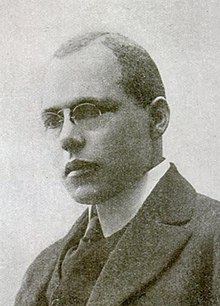Emmett Jay Scott
| Emmett Jay Scott | |
|---|---|
 |
|
| Born | February 13, 1873 Houston, Texas, United States |
| Died | December 12, 1957 (aged 84) United States |
| Occupation | Political advisor, educator, publicist |
Emmett Jay Scott (February 13, 1873 – December 12, 1957) was an educator and publicist, known as Booker T. Washington's closest adviser at the Tuskegee Institute and as Special Adviser of Black Affairs to Secretary of War Newton D. Baker. He was the highest-ranking African American in President Woodrow Wilson's administration.
Scott was born in Houston, Texas in 1873, son to former slaves Horace Lacy Scott and Emma Kyle. He began his studies at Wiley College in 1887, but left 3 years later to pursue a career in journalism.
Scott found work at The Houston Post, which was then staffed by whites. Scott started work there as a janitor, working his way up to messenger and eventually as a reporter. He and friends knew that the city's African-American community was not receiving adequate coverage. Scott joined Charles N. Love and Jack Tibbitto in founding Houston's first African-American newspaper, the Texas Freeman. Scott became editor soon after the newspaper began circulation. His leadership expanded the Texas Freeman's presence in the Houston region, making it a prominent publication throughout Texas.
Scott met Booker T. Washington, who was developing the Tuskegee Institute. He went to work as his assistant and personal secretary, working closely with him on management of the college, fundraising, and building networks with philanthropists.
After the election of President Woodrow Wilson, as the United States moved closer to war, Scott was appointed as Special Assistant for Negro Affairs to the Secretary of War Newton D. Baker. Scott was the highest-ranking African American in the administration. He selected William Henry Davis to serve as his own assistant and staff manager, helping to ensure blacks were treated fairly by the War Department.
In June 1918 Scott organized a meeting of African-American journalists and business leaders to recommend a Black journalist to the U.S. War Department for reporting on the Negro troops in World War I. Ralph Waldo Tyler was selected to report on the Black troops at the front, and he became the first African-American foreign war correspondent. Tyler's reports were screened by the U.S. Committee on Public Information, then they were reviewed by Scott. He selected letters to be syndicated through the Black press.
...
Wikipedia
